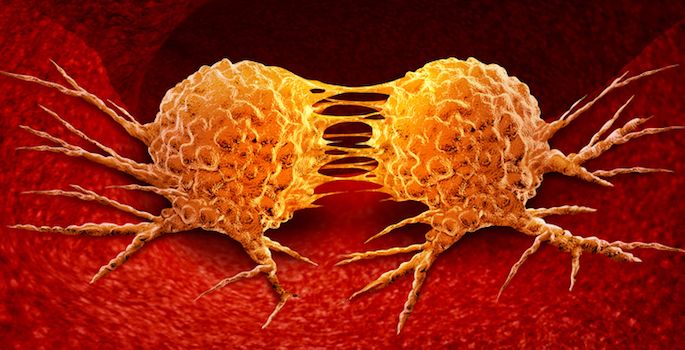Leigh MacMillan
-

How salt increases blood pressure
Vanderbilt researchers have discovered that a protein called SGK1 in immune cells is activated by sodium, leading to the development of salt-sensitive hypertension. Read MoreSep 5, 2019
-

Cancer susceptibility genes
Gene variants associated with cancer risk appear to contribute to carcinogenesis by regulating target genes that in turn promote the generation of mutations. Read MoreAug 26, 2019
-

New prostate cancer treatment concept
Combining immunotherapy and radiation therapy may be a powerful treatment approach for castration-resistant prostate cancer. Read MoreAug 22, 2019
-

Host-microbe interactions in the gut
Vanderbilt investigators demonstrated that intestinal cells promote beneficial microbe behavior — the findings support developing microbiota-based therapies for intestinal health. Read MoreAug 13, 2019
-

A probiotic treatment for obesity?
Engineered bacteria that produce beneficial compounds — and that could potentially be administered in foods like yogurt — may be a future treatment for obesity and other chronic diseases. Read MoreAug 8, 2019
-

Cellular engines of wound repair have distinct roles
Vanderbilt investigators have now discovered that, in contrast to prevailing dogma, fibroblasts are not all alike; instead, they have distinctive functions following tissue injury. Read MoreAug 8, 2019
-

Intestinal immune cell interactions
Understanding the roles of various immune cells that reside in the gut lining could shed light on inflammatory bowel diseases. Read MoreJul 30, 2019
-

Team’s study reveals details of new DNA repair pathway
Investigators have discovered how a DNA repair pathway protein shields sites of damage to avoid mutations and maintain genome integrity. Read MoreJul 25, 2019
-

Madhur receives Presidential Early Career Award
Meena Madhur, MD, PhD, has received a Presidential Early Career Award for Scientists and Engineers. Read MoreJul 18, 2019
-

Clinical study tests drug that may prevent cancer metastasis
A clinical study of a drug that may block cancer metastasis is currently enrolling patients at the Vanderbilt-Ingram Cancer Center. Read MoreJul 8, 2019
-

Early detection of schizophrenia
Inhibited temperament—a tendency to respond to novelty with wariness, fear or caution—may be a risk factor for schizophrenia that could be targeted for preventative interventions. Read MoreJun 24, 2019
-

Fish oil and cancer prevention
Fish oil supplementation provides a modest but beneficial effect on reducing molecules associated with colorectal cancer development. Read MoreJun 24, 2019
-

Cell-cell signals in developing heart
Scott Baldwin and colleagues have discovered early signaling events during heart development, findings that could guide cell replacement therapies for heart disease. Read MoreJun 10, 2019
-

Mouth health and colorectal cancer
Microbial species in the mouth could be playing a role in colorectal cancer development, according to new research from epidemiologists at VUMC. Read MoreJun 6, 2019
-

Carrasco to lead Department of Molecular Physiology and Biophysics
Dr. Nancy Carrasco, a leading figure in the study of iodide transport and its critical role in the thyroid and mammary glands, has been named chair of Vanderbilt's Department of Molecular Physiology and Biophysics. Read MoreAug 21, 2018
-

New staph virulence factor
The new factor, an enzyme involved in host-pathogen interactions, may be a viable target for treating staph infections. Read MoreJun 28, 2018
-

New BRET course offers introduction to data science
From left, Ashley Brady, PhD, Kim Petrie, PhD, and Kathy Gould, PhD, have been awarded a grant from the Burroughs Wellcome Fund to offer a new career development ASPIRE Module focused on data science. (photo by Joe Howell) Biomedical science trainees at Vanderbilt have a new career exploration option starting… Read MoreJun 21, 2018
-

Karijolich named 2018 Pew Biomedical Scholar
John Karijolich, PhD, assistant professor of Pathology, Microbiology, and Immunology at Vanderbilt University Medical Center, has been named a Pew Biomedical Scholar by The Pew Charitable Trusts. Read MoreJun 14, 2018
-

Grant bolsters Hiremath’s research on esophageal disorder
Girish Hiremath, MD, MPH, assistant professor of Pediatrics, has received a Junior Faculty Development Grant from the American College of Gastroenterology Institute for Clinical Research and Education. Read MoreJun 14, 2018
-

Evolution of a deadly virus
Genomic sequences have revealed that Florida is a major source of a mosquito-borne virus that causes disease in horses and humans. Read MoreMay 23, 2018